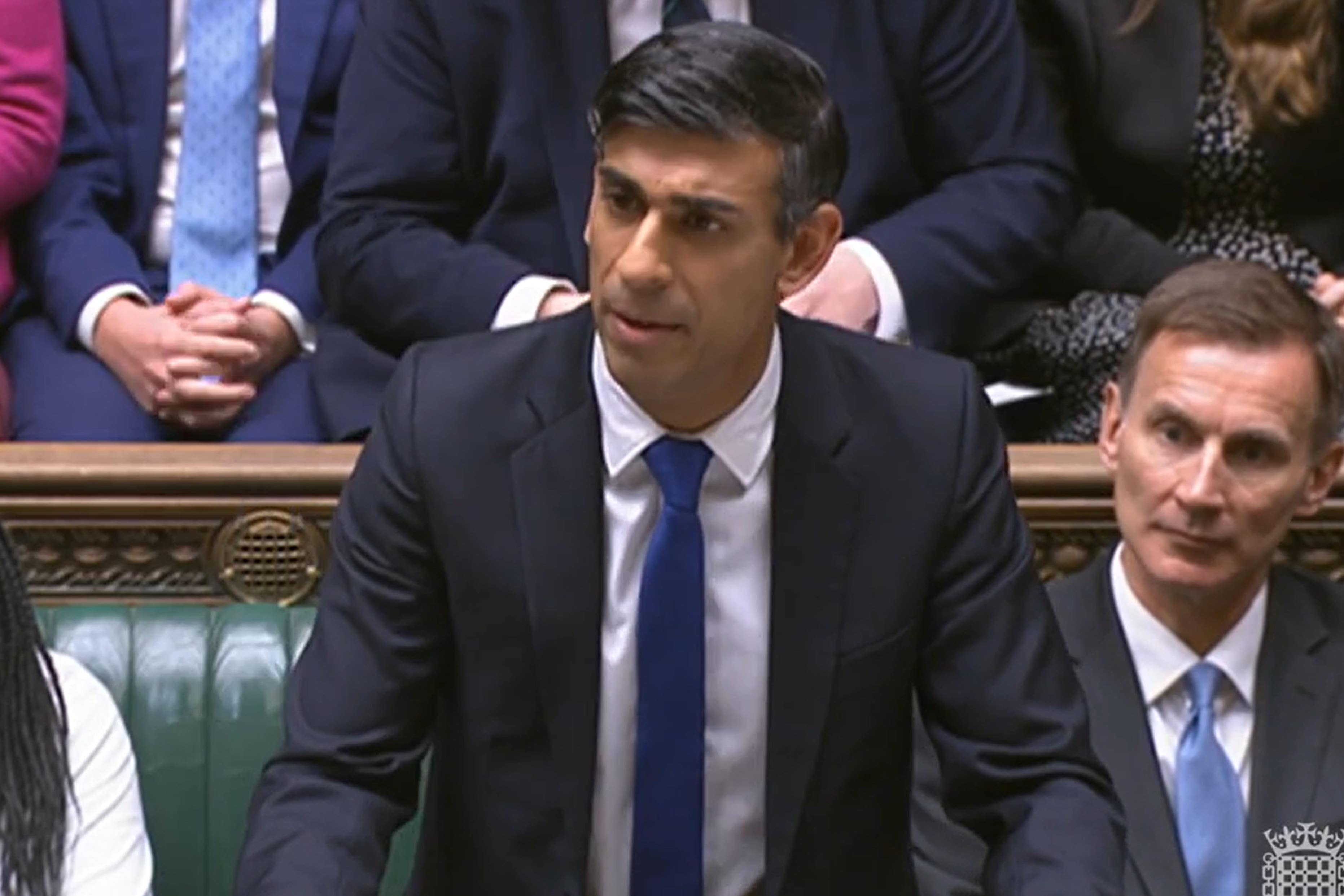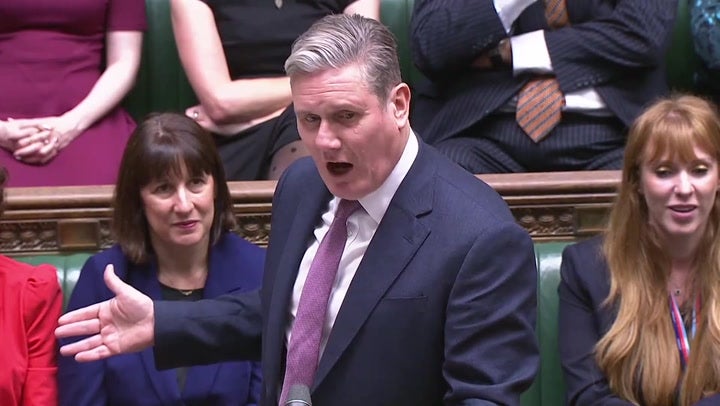Rishi Sunak urges Israel to ‘pause’ conflict and let aid into Gaza
No 10 says ‘pause’ in conflict could help alleviate what many fear is becoming a full-scale humanitarian crisis as water, medical supplies and fuel run out

Rishi Sunak has backed “pauses” in the Israel-Hamas conflict to allow crucial aid into Gaza amid warnings fuel could run out within hours – but he rejected calls for a ceasefire.
Short breaks in hostilities could allow hostages and British nationals out of the besieged enclave, the prime minister said on Wednesday.
But a wholesale ceasefire would only benefit Hamas, two weeks after it killed 1,400 people in Israel and seized more than 200 hostages, No 10 said.
The health ministry in Gaza said more than 5,700 Palestinians have been killed in the conflict, including 2,300 children.
Mr Sunak’s call echoes that of the United States, the United Nations and other countries for specific pauses, as distinct from a ceasefire, to alleviate what many fear is becoming a full-scale humanitarian crisis as water, medical supplies and fuel run out.
More than 80 MPs have urged the government to call for a ceasefire, as five UK nationals remain missing, some of whom are believed to be hostages in Gaza.
It comes as Labour was plunged into crisis over its stance on Israel’s bombardment of Gaza, with Sir Keir Starmer also under mounting pressure from Muslim MPs and others to call for a ceasefire.
Mr Sunak’s intervention follows:
- a UN warning that aid workers could be forced to halt humanitarian operations if Israel does not lift its blockade on fuel due to run out on Wednesday night
- UN chief Antonio Guterres denying a “blood libel” justification for Hamas’s terror after he said the deadly 7 October attack “did not happen in a vacuum”
- Lebanese militant group Hezbollah meeting with Hamas and Islamic Jihad to discuss what their alliance must do to achieve “real victory for the resistance” in Gaza
- The UK sent an RAF plane to Egypt with 21 tonnes of humanitarian supplies
As the crisis mounted, the Hamas-run health ministry said Gaza’s health system has collapsed, as the United Nations warned that unless there was an immediate delivery of fuel its support to Gaza’s hospitals, bakeries, and desalination plants “can stop tomorrow [Thursday]”.
Speaking to The Independent, Tamara el-Rifae, a spokesperson for UNRWA, the UN’s Palestinian refugee agency, said: “There has to be a way to get the fuel in otherwise everything can stop tomorrow [Thursday], or we have to make extremely hard choices.”
It comes as The Wall Street Journal reported that Israel has agreed to delay an expected invasion of Gaza for now so that the United States can rush missile defences to the region to protect US troops there.
The warning on the desperate need for supplies came as Mr Sunak told MPs at Prime Minister’s Questions that the UK has already discussed the idea of humanitarian pauses in the fighting to allow vital aid in with other countries at the United Nations.

He said the government wanted Britons to be able to leave Gaza, for hostages to be released and for supplies to cross over into the area. “And we recognise for all of that to happen there has to be a safer environment, which of course necessitates specific pauses, as distinct from a ceasefire,” he said.
His call came hours after the US secretary of state Antony Blinken defended Israel’s military actions but said that “humanitarian pauses must be considered” to protect civilians in Gaza.
Calls for “humanitarian pauses” could be included in a UN Security Council Resolution, No 10 indicated. Unlike a ceasefire, these would be temporary and limited in scope. How they would work and how long they might last were for discussion, Downing Street said. Israeli agreement to a series of pauses in the conflict would be a question “for them”, it added.
Mr Sunak made the call as he announced that an RAF plane was en route to Egypt with 21 tonnes of humanitarian supplies.
The Egyptian Red Crescent was tasked with distributing the cargo of 76,800 wound care packs, 1,350 water filters and 2,560 solar lights.
Oxfam said starvation was being used “as a weapon of war” as it repeated its call for more aid to be allowed into the bombarded strip.
Mr Sunak also rejected calls to back a ceasefire, reiterating the government’s stance that Israel has the “right to protect itself” after suffering a “shockingly brutal terrorist attack” at the hands of Hamas on 7 October.
Labour backed the call for pauses in the conflict but Sir Keir refused to give in to the dozens of backbench MPs who signed a motion urging the British government to call for an immediate ceasefire.

A spokesperson for the Labour leader said: “Antony Blinken said ... humanitarian pauses must be considered. That seems to be something that Downing Street is now echoing and we would obviously fully support that position.”
On a tumultuous day for his leadership, Sir Keir held crunch talks with a group of Muslim MPs and peers to address a growing rift in the party over its stance on Israel, including comments he made appearing to back the restriction of power and water to the city’s 2 million inhabitants.
One MP present told The Independent there was a “robust” exchange during which the Labour leader accepted that there was “work to be done” to win back the trust of Muslim voters.
He was also grilled over why it took more than a week for him to clarify his remarks in an LBC interview, in which he said Israel “has the right” to withhold power and water from Gaza. He later argued he had intended to say that Israel has the right to defend itself and retrieve the around 200 hostages being held – “within international law”.
The MPs welcomed “progress” in Sir Keir’s stance on the backing of “humanitarian pauses”.
But a spokesperson for left-wing pressure group Momentum said it did not go far enough. It said: “Brief pauses in bombing are not a ceasefire – it is clear that Keir Starmer’s Labour is continuing to back Israel’s war on Gaza. Warm words about a two-state solution do not change this fundamental truth.
“Nor is Labour’s call for aid to reach those who need it credible, as long as it’s accompanied by effective support for blanket bombing and forced population transfer. Ultimately, the choice is simple. You either back a ceasefire, or you don’t.”





Join our commenting forum
Join thought-provoking conversations, follow other Independent readers and see their replies
Comments